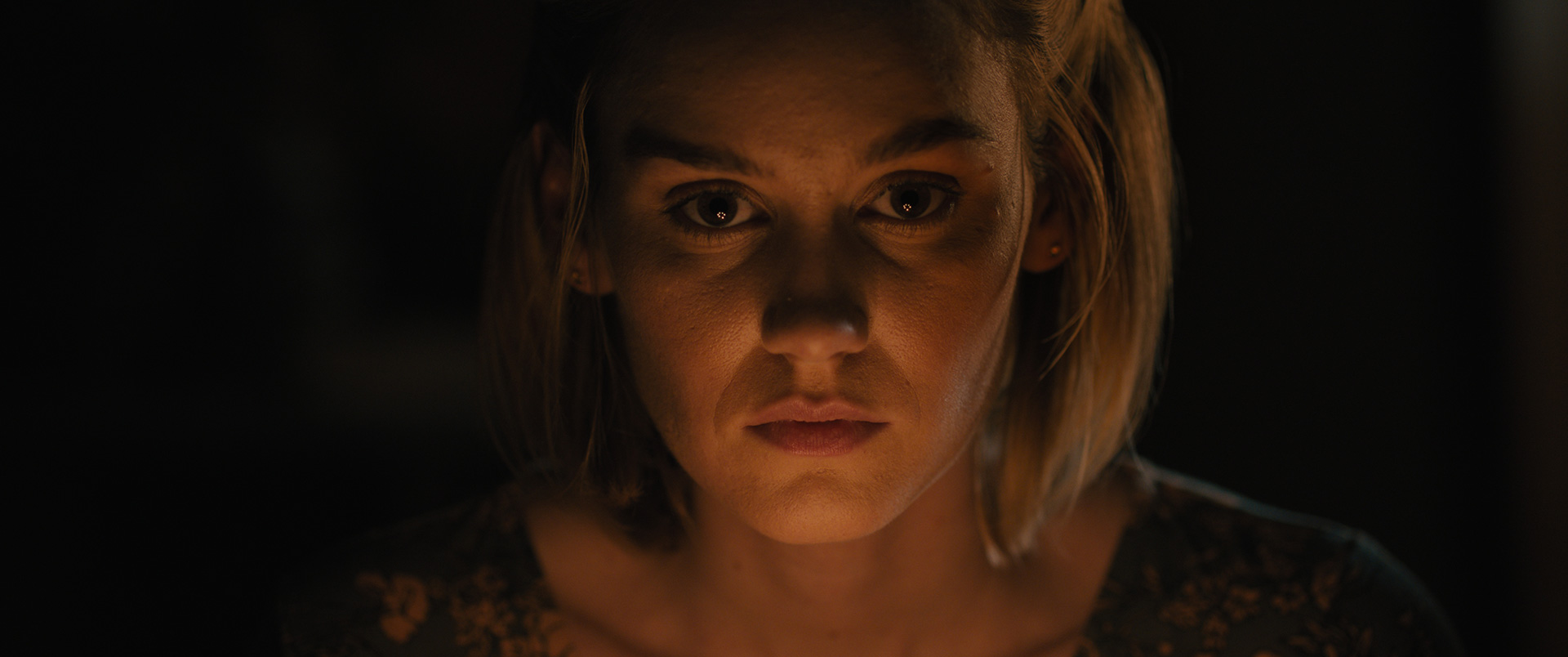Christina Bowden (Lexi Johnson) is an elementary school teacher with aspirations to adopt. The paperwork is filed, the young teen (Willow McCarthy’s Lisa) targeted is on-board, and it seems the last remnants of Christina’s volatile past have been repurposed for good. Kidnapped and raised in a shack by her captor (Kaye Tuckerman’s Elizabeth Caulfield), fate somehow allowed her the second chance her four “sisters” tragically never received. She wants to therefore be a lightning rod for change in the community by using that experience from two decades ago to better understand and care for a new generation struggling to deal with similar psychological trauma. Being the lone survivor of a brutal ordeal gives her insight many would-be suburban parents can’t even fathom. And she’s ready to officially move forward.
Writer-director Michael Morrissey has other ideas, though. Rather than give Christina her happy ending, he concocts a jailbreak wherein Caulfield goes free. The cop in charge way back then (Ned Van Zandt’s Gerry) might be retired now, but he understands the gravity of the situation and calls his old protégé Jamie (Chukwudi Iwuji) to swing by her house and make certain she remains safe. Where else would Caulfield go? Christina’s mere existence serves as unfinished business and the number of bodies that soon fall proves it, despite a wrinkle Jamie can’t quite shake. Every night while on guard duty he sees a sleepwalking Christina stumbling back inside from the forest covered in dirt. Is Caulfield murdering people she shouldn’t know exist? Or has something within her “daughter” awoken?
Therein lies the intrigue behind The Girl Who Got Away. A known homicidal maniac is on the loose and the victims found brutally murdered are people close (good or bad) to Christina, but the knee-jerk reaction to connect the two only works if you’re not paying attention. Why? Because Caulfield has been in prison for twenty years. How would she therefore know who to target? The simpler answer is thus that Christina is the culprit. No matter how much Gerry wants to protect her and how much Jamie wants to believe she is the person who needs protection, the evidence at least merits taking a breath to dig a little further. As soon as new secrets are uncovered and crucial connections revealed, however, the puzzle only grows.
I must give Morrissey credit—I didn’t think he’d be able to make this film work. He’s introducing so many characters and so many shared histories that it initially appears to be a ploy to distract us with superfluous information as he lets the real mystery unfold. This isn’t the case, though. Even more, that excess of exposition helps confuse the truth so that we can’t be sure which woman is the real killer. Morrissey is definitely toying with us, but he has an endgame that generally seeks to culminate with respect for his audience. It might not be true every time, but most purposefully unexplained events are given enough external context to figure out yourself—if willing to go that extra mile.
There’s a reason we don’t hear about everything we’ve seen. For instance: Caulfield kills three people early on during her escape. Jamie only tells Christina about the FBI agent that was driving her to a medical check-up. Because the tow truck driver and random stranger with the unfortunate luck of using the wrong gas station bathroom at the wrong time aren’t narratively worthwhile yet, Morrissey keeps them hanging in the wind. We remember, though. We keep them in the back of our heads so throwaway lines that come later—like Jamie saying they found the stolen tow truck abandoned on the side of a road—can tie those loose ends without overtly drawing attention. While he manipulates them as subterfuge, it’s never at our expense.
Where things get tricky is that he also leaves some open-ended without intending to provide closure. Thus mixing both options can be tiring—we never know which is which until answers arrive (or don’t). Just know this: there aren’t any plot holes I can see. What may seem like one is either explained by something you’ve already witnessed or validated by an ending that cannot be described as anything other than complicated. Like so much of the film, good deeds never go unpunished. There are always reasons behind the reasons we’re given; some, like Gerry’s interest in the case, may even go three layers deep. No one here is innocent and no one said having two killers loose wasn’t a legitimate possibility.
It’s that level of narrative complexity that helps us look past the wonky bits caused by budgetary constraints. There are some weird moments (Christina reading a class of children an obviously illustrated book with only one rhymed sentence per spread and yet never showing them the imagery before turning the page), comical foley (the first scream is a Wilhelm and it will ruin any suspense that might have been built prior), and some questionable acting, but it’s easy to ignore them when the story is captivating enough to push through. You might not have all the pieces fitting perfectly by the time the credits roll (I know I didn’t), but hindsight quickly fills in the blanks. That’s a testament to an underrated script and a deceivingly worthwhile film.
The Girl Who Got Away hits limited release an VOD on August 20.

